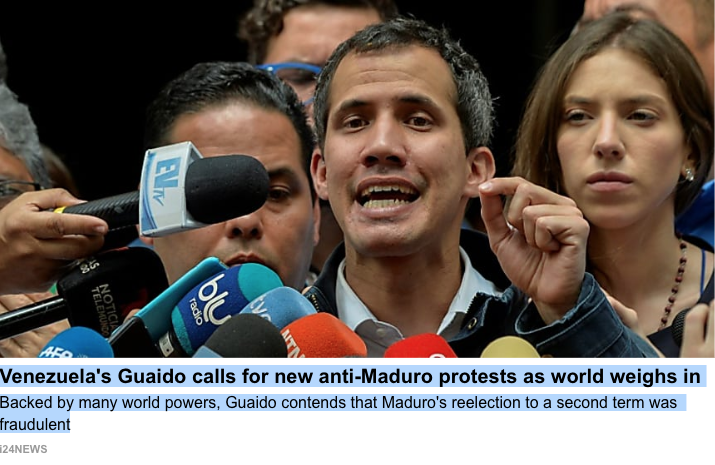Venezuela’s Guaido calls for more protests to force out Maduro
The protests follow a declaration of support for Guaido from a top Venezuelan air force general
Opposition leader Juan Guaido called for more street protests as tens of thousands of his supporters rallied in Venezuela on Saturday while socialist leader Nicolas Maduro resisted pressure to call a new presidential election.
Self-declared acting president Guaido, 35, had called Saturday’s protest to ramp up the pressure on Maduro to step down.
He received a boost before it began when an air force general became the highest ranking officer to abandon Maduro and recognize the National Assembly head as the country’s true leader.
United States National Security Advisor John Bolton responded to that in a tweet calling on “all military members to follow General (Francisco) Yanez’s lead.”
The US recognized Guaido as Venezuela’s interim president 10 days ago while four major European nations — Britain, France, Germany and Spain — have said they will do likewise unless Maduro calls presidential elections by midnight on Sunday.
Major European countries have set a Sunday deadline for Maduro to call snap presidential elections. Failing that, they will join the United States in recognizing National Assembly speaker Guaido as Venezuela’s interim president.
“Maduro’s tyranny must end and must end now,” US Vice President Mike Pence told a rally of exiled Venezuelans in Miami on the eve of the protest.
Guaido’s call for a massive show of popular support coincides with a huge pro-Maduro demonstration.
‘Let’s have elections’ –
Speaking at a pro-regime demonstration marking 20 years since his predecessor Hugo Chavez came to power, Maduro ignored those demands and instead reiterated his call to bring forward parliamentary elections slated for the end of 2020 to this year.
“They (the opposition) want to bring forward elections, let’s have elections,” he said in a reference to the opposition.
Maduro, making his first public appearance since claiming to have survived an assassination attempt six months ago, accused Guaido of being a US “puppet” in a coup d’etat attempt.
The National Assembly is the only one of Venezuela’s five government branches controlled by the opposition.
Guaido had earlier urged the armed forces to allow into the country humanitarian aid that would be gathered in Colombia, Brazil and a Caribbean Island.
“You, soldier… have the decision in your hands” to allow it in or not, said Guaido.
Under Maduro’s stewardship, oil-dependent Venezuela has lurched into an economic crisis that has left the country with hyperinflation and shortages of food and medicine.
Maduro refuses to let aid into the country, claiming it would precede a US led military intervention.
“We’ve never been nor are a country of beggars,” he told thousands of his supporters in the heart of Caracas.
“There are some people who feel like beggars to imperialism and sell their homeland for $20 million,” he added, referring to the amount of food and medicine aid offered by the US.
– Assurances to China –
Russia and China, though, have denounced US interventionism and voiced support for Maduro, whose regime owes both countries billions of dollars.
Guaido told Saturday’s edition of the South China Morning Post that he would not disrupt the relationship with China despite his close ties to the US.
“China’s support will be very important in boosting our country’s economy and future development,” he said in an email interview.
“We are ready to begin a constructive relationship and dialogue with China as soon as possible.”
China’s foreign ministry spokesman Geng Shuang said cooperation between the countries would continue “no matter how the situation changes” in Venezuela.
European Parliament lawmakers recognized Guaido on Thursday as the interim head of state.
And four major European powers — Britain, France, Germany and Spain — have said they will do so if Maduro fails to call presidential elections by midnight on Sunday.
The international heave against Maduro’s leftist regime came after weeks of behind-the-scenes diplomacy including secret talks in Washington between Guaido and US officials.
“Nicolas Maduro will do well not to test the resolve of the United States of America,” Pence warned on Friday.
– ‘Decisive’ –
Guaido called for a new demonstration on February 12 and said there would be yet another one related to the humanitarian aid.
Speaking at the European Union’s headquarters in the east of the capital, he said this month “should be decisive.”
The rival Caracas rallies, separated by 10 kilometers (six miles), attracted huge crowds.
Banners at the opposition rally read: “Get out dictator” and “Maduro usurper.”
At the pro-Maduro demonstration one said: “Go to hell, shitty Yankees.”
Early on Saturday, General Yanez said in a social media video that he disavowed Maduro’s “dictatorial” authority and recognized Guaido as the acting president.
The air force high command strategic planning director said “90 percent of the armed forces don’t support the dictator.”
His defection is “a hard blow” to Maduro, said Rocio San Miguel, an expert on the Venezuelan military.
The Venezuelan air force posted a picture of Yanez on its Twitter account tagged with the word “traitor.”
The military and security forces have so far been Maduro’s main pillar of support, but there have been signs of unrest in the ranks.
On January 21, a group of 27 soldiers rose up against Maduro in Caracas, although that was quickly suppressed.
It helped spark a week of protests in which 40 people were killed in clashes with security forces, with hundreds more arrested.
Guaido, who has offered amnesty to members of the military that abandon Maduro, acknowledges that he needs its support.
